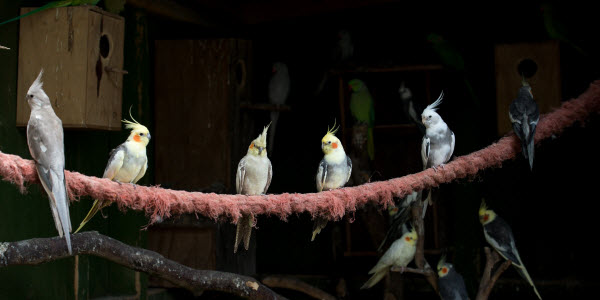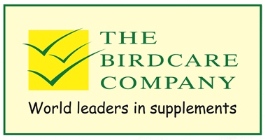Posted by Malcolm Green on 1st Nov 2022
Avian Flu – what can you do?

There is little doubt that one of the most troubling issues facing bird keepers this year is avian flu. Even the government is getting excited about it as they fear it will mutate into a variety that will easily transmit from human to human and lead to an epidemic. Of course this part of the story is far from inevitable.
Already the Government is putting restrictions of the housing of our cage and aviary birds. Fortunately you have access to modern, sophisticated products that should help enormously.
In the absence of vaccines there are really only three ways to effectively deal with viral diseases - good hygiene, good bio-security and effective support for the bird’s own immune system. Fortunately these same issues make sense for other infectious germs and they even contribute to improved breeding performance. So they make sense anyway.
Bio-security
I will deal with bio-security first. This is all about keeping nasty germs away from your flock. Since Covid-19 we should all be pretty used to this stuff by now!
1. Start by roofing outdoor aviaries to reduce the contamination risk from wild birds. Depending where you live you may have to keep your birds “inside”.
2. Make sure you and your clothes are clean before you visit your birds. Consider a disinfectant foot bath outside your bird room. Make sure your disinfectant kills viruses as well as bacteria and will remain active for a long time. Most disinfectants are only active for a few hours after diluting with water. Avisafe is DEFRA approved for Avian Flu, strongly recommended and used by many vets and will last for up to six months. However, the more you contaminate it the quicker it goes off so we would recommend changing it MUCH more frequently than that if you contaminate it a lot with soil and dirt and boots.
3. Disinfect your hands between everything you handle with a hand scrub that has broad spectrum activity. You probably have this left over from Covid too.
4. Use a water sanitiser in all drinking water. Water is a major cause of spreading diseases between cages. Aviclens is designed for use with birds and has been proven by thousands of bird keepers over many years.
5. If you have infected or suspect birds isolate them from the rest of your flock. Always feed the healthy birds first and change and wash clothes immediately you leave any infected birds.
6. Do not wash feeders and drinkers from healthy and infected birds in the same washing-up water. Use a combined disinfectant/cleaner to wash all cages and utensils such as Avisafe.
7. If you do buy new birds in then follow strict quarantine procedures.
Hygiene
It would be easy to say that the right thing to do is to keep everything in your bird room spotlessly clean and sterile. Your birds would never be exposed to germs and so they would never get ill. Of course this is Utopia and not practical. This is not necessarily the best advice either as the immune system needs to be challenged to work most efficiently.
However, if your birds are at risk strict hygiene is essential. Baby birds (especially hand reared ones) do not have well-developed immune systems so they need extra special care. Ensuring that feed and water containers are cleaned properly and that cages are routinely disinfected is simple sound advice. The really important factor to consider is whether your disinfectant kills a broad spectrum of germs. Many only kill bacteria and yet, as pointed out earlier, we have already discovered that viruses are a major threat. Don’t forget the risk from yeasts and fungi too.
Avisafe is effective against viruses, yeasts, fungi and bacteria. It is also an excellent cleaner so is great for removing bird droppings from cages and perches. It can be used as a washing-up liquid or sprayed onto cage walls and perches and left to dry. There is no need to remove birds from the cages. The most attractive features of Avisafe are its pleasant smell and economy. Because it stays active in water for up to six months most people dilute it in a spray bottle and apply it that way. This uses far less disinfectant than the usual cloth and bucket technique.
The immune system
This is probably the most important weapon we have against viral and other infections. Sadly it is probably the least recognised option in aviculture. The immune system is working all the time to protect you and your bird from invading organisms. To describe it as a single ‘system’ is something of an oversimplification. It actually works at a number of different levels.
Your birds first line of defence is its skin and the membranes that line the surfaces of the gut and respiratory tract (a sort of internal skin). Apart from being a barrier the cells in these surfaces produce chemicals that kill many germs. Natural anti-biotics if you like.
For cell membranes to function effectively they need an adequate supply of vitamin A. Since dry seeds contain virtually no vitamin A it is not surprising that the immune system of many cage and aviary birds is not very effective!
The vast majority of germs and many toxic chemicals should be cut off by this first line of defence however some get in through cuts or simply overwhelm the system.
The second line of defence is the white blood cells. There are lots of different white blood cells and they operate in many different ways. To simplify the subject I will briefly describe three mechanisms.
In the first attack white blood cells literally surround and devour the invading germs. This is really easy to understand though the mechanism by which the invader is recognised is very complex.
The battle becomes much more difficult when the invading germs have entered your bird’s cells. Viruses use the host’s cells to multiply. At this point the host cells themselves have to be destroyed by white cells. This is the stage in your common cold when you, not surprisingly, have a very sore throat. It may hurt but this sore throat is evidence that your immune system is engaged in the battle.
At the third level yet other types of white cells produce antibodies. These are proteins that lock onto the germs and prevent them from invading the host’s cells. These are the equivalent of ‘smart bombs’.
Unless the immune system has been invaded by the same germ before, the design, development and production of antibodies takes time as each new germ needs a tailor-made solution. Once an antibody has been produced its design is stored away in another type of white cells. Amazingly the body may only retain three cells amongst trillions with each magic formulation in it but, when the same germ strikes again, the production of antibodies is rapid and effective. This is the principle behind vaccination. Unfortunately the development and licensing of vaccines is extremely expensive so only a few bird diseases have been covered. No cage bird vaccines are licensed in the UK. Any limited supplies of vaccines against bird flu will first of all go to health workers and vets involved in dealing with any cases. You and your birds have no chance of getting any!
One key issue about immunity is that the system needs to be challenged regularly for it to function efficiently. This is why birds kept in totally sterile environments are very vulnerable to contact with other birds from less hygienic aviaries. So hygiene is a balancing act. Too clean is bad. Too dirty is bad!
Supporting the immune system
So what can we do to enable our birds to mount an effective immune response when faced with a germ invasion?
The first thing is to get the fundamental nutrition right. Birds that are vitamin and mineral deficient simply cannot respond effectively. Their cell walls will be poorly formed and they cannot repel invaders or fight back rapidly. Producing billions of white cells in a short period of time will be impossible.
Sadly, through lack of knowledge, most cage and aviary birds around the world are not fed satisfactory diets. Research in America suggests that the number of malnourished birds is as high as 98%! Many bird vets will tell you that 90% of the cases they see have malnutrition as the basis of their illness. This does not mean that bird keepers don’t care, it simply highlights the lack of good information available.
Secondly we can help by minimising stress. Stress reduces the immune response. This can be caused by poor housing, moulting, breeding, poor nutrition (again), overcrowding, changes in housing or companionship, over exposure to germs and a host of other factors.
It is commonly reported that many drugs depress the immune response. So care should always be taken when considering whether drugs or immune support are the best options. And remember there are no anti-viral drugs available for your birds!
The biggest problem with stress is that it feeds on itself. A stressed bird gets ill. Illness causes stress. It is not surprising that some birds die so quickly!
Many wild animals are capable of treating themselves when they get ill. Somehow they are able to identify plants and other materials that help them feel better. Many of these are plants that, if eaten in large quantities, would be poisonous to the animal. However in moderation they hurt the germs more than the host.
Unfortunately our captive birds are unlikely to have the freedom of choice and food selection to respond to sickness in this way. We could respond to sickness in our birds by using appropriate herbs but this requires excellent stockmanship (to detect the problem early) and a detailed knowledge of herbal medicine. However by carefully selecting safe herbs The Birdcare Company is able to give natural support to birds as part of their regular diet. These herbs can prevent some specific diseases, support the digestive system (prebiotics) and help the immune system. We incorporate some of these ingredients into our Feast range of softfoods making them quite unique in the health benefits they provide. Although Feast is proving more and more popular with parrot owners many prefer to add the herbal supplement Flourish to moist foods instead.
Feast and Flourish are part of the firm’s more extensive supplement system and readers are strongly advised to ensure their birds are also getting Daily Essentials3 and Calcivet for fully comprehensive supplementation.
You have read quite a lot about white blood cells in this article. For them to have a powerful impact on disease they need to be produced in their billions in a very short period of time. Each cell has to be complete so all the raw materials required for cell production must be available in adequate quantities. Partly we are back to the basic nutrition story again. More importantly each new cell needs a complete compliment of genetic material. This can very quickly get into short supply especially when the bird is under infectious attack. So, when birds get infectious diseases, we recommend products with extra quantities of these key ingredients. We call this our ‘white cell support system’ and you will find it in Guardian Angel.
The Birdcare Company is one of the world’s innovators in the provision of immune system support. No other bird supplements manufacturer, anywhere in the world, can give you the same level of assistance. Visit our web site www.BirdcareCo.com or send us an e-mail advice@BirdcareCo.com.
